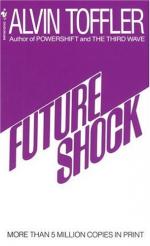
|
| Name: _________________________ | Period: ___________________ |
This test consists of 15 multiple choice questions and 5 short answer questions.
Multiple Choice Questions
1. What does Toffler predict will come out of genetics?
(a) Cloning.
(b) Medical gene therapies.
(c) Wars over intellectual property.
(d) Cut-throat pharmaceutical companies.
2. What is NOT a characteristic of the bureaucracy?
(a) People are free to move from one role to another.
(b) People occupy a place in the vertical hierarchy.
(c) Organizational relationships are permanent.
(d) People occupy a place in the division of labor.
3. What techniques had Japan pioneered at the time of Toffler's writing?
(a) Mapping underwater resources.
(b) Whaling.
(c) Living underwater.
(d) Using bacteria in food production.
4. What does the automobile contribute to super-industrial culture?
(a) Increased mobility.
(b) Diminished family loyalty.
(c) Decreased efficiency.
(d) More and more industrial waste.
5. What contributes to the high rate of change in organizations?
(a) Mergers.
(b) Mechanization.
(c) Mortgages.
(d) Mobility.
6. What will companies manufacture in Toffler's future?
(a) Experiences.
(b) Transportation networks.
(c) Computer devices.
(d) Social services.
7. What medical developments does Toffler say will result in moral conundrums?
(a) Better joint replacement techniques.
(b) Organ transplants.
(c) Preventative care techniques.
(d) Cancer surgery.
8. How do people learn to be aware of time, as Toffler describes it?
(a) They keep solar calendars.
(b) They measure their progress against the seasons.
(c) They develop "durational expectancies."
(d) They repeat the experiences of their ancestors.
9. Which groups move most often, in Toffler's account?
(a) Technical workers.
(b) Agricultural workers.
(c) Mechanics.
(d) Doctors and dentists.
10. What is the reason for the shortening of relationships?
(a) Transportation.
(b) Finance.
(c) Urbanization.
(d) Mechanization.
11. Where does culture shock take place, in Toffler's account?
(a) Urban populations.
(b) All modern people.
(c) Foreign travelers.
(d) Developing nations.
12. What term does Toffler use to describe the future society?
(a) Technological totalitarianism.
(b) Mega-production.
(c) Super-industrialism.
(d) Transnational capitalism.
13. With whom does a person have medium-term relationships, according to Toffler?
(a) Family.
(b) Clerks.
(c) Barbers.
(d) Neighbors.
14. In what way is spring break in Ft. Lauderdale exemplary of super-industrial culture?
(a) Students get to experiment with their personalities.
(b) Students get a degree of freedom they don't have anywhere else.
(c) Students destroy the environment and leave.
(d) Students form temporary relationships.
15. Which relationship is not one of the relationships Toffler describes as comprising social experience?
(a) People.
(b) Morals.
(c) Places.
(d) Organizations.
Short Answer Questions
1. How have careers changed in super-industrial culture?
2. What will changes in agriculture mean for the future Toffler foresees?
3. What do deeper relationships involve, in Toffler's account?
4. What is happening to the bureaucracy, in Toffler's account?
5. What does Toffler call the worker in the new organization?
|
This section contains 453 words (approx. 2 pages at 300 words per page) |

|




